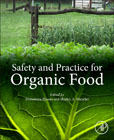
Safety and Practice of Organic Food covers current food safety issues and trends useful to anyone in food safety. It provides detailed information on all organic/pasture practices including produce only, farm animal only or integrated crop-livestock farming, as well as the impact of these practices on food safety. The book explores the food products that organic and integrated/traditional farming systems are contributing to the consumers. As the demand for organic food products are growing faster than ever, this book provides concurrent information for better practices for grower and processor and safer products for the consumer. Moreover, the book explores how the most advanced tools at our disposal, such as genomics, that can help better understand the microbial ecology of the agro-environment. This book is a unique source of organic agriculture practice and food production for researchers, professors and professional at agricultural-based universities and colleges who are involved in food science, animal sciences including poultry science, food safety, food microbiology, plant science, and agricultural extension. This book is an excellent source of information for the regulators and federal government (USDA, FDA, EPA) and food processing industries. Discusses limitations in pre-harvest and post-harvest level practices with specific information on risk and bio-security of the existing organic production systemsExplores policies and guidelines for organic food production, and future directions for safer and sustainable production and practicesPresents microbial and biological hazards such as toxins in both pre-harvest and post-harvest levelsProvides alternative antimicrobials and their use in organic production of plant and animal food products INDICE: Organic Food Products, Diverse Production Practices, and Policies 1. The Growing Market of Organic Foods: Impact on the US and Global Economy 2. Organic Farming Practices: Integrated Culture Versus Monoculture 3. Governmental Policies and Regulations including FSMA on Organic Farming in the United States and Around the Globe 4. Major Issues and Limitations in Organic Farming in the US Quality and Safety Concerns of Organic Food 5. A Nutritional Perspective: Importance of Organic Foods Over Conventional Counterparts 6. Listed Foodborne Disease Outbreaks Associated with Organic Foods: Animal and Plant Products 7. Food Safety Risks and Issues Associated with Farming and Handling Practices for Organic Certified Fresh Produce 8. Proper Farm Management Strategies for Safer Organic Animal farming practice 9. Effective farm management strategies for organic produce and plant food production 10. Alternatives to pest and disease control in pre-harvest, and washing and processing in post-harvest levels for organic produce Recommendations and intervention for Improving Safety and Sustainable Organic Food 11. The Plant Microbiome: Diversity, Dynamics and Role in Food Safety 12. Control strategies for post-harvest microbiological safety of produce during processing, marketing and quality measures 13. Control strategy for post-harvest microbiological safety of animal products during processing, marketing and quality measures 14. Future of organic farming: bringing technological marvels to the field 15. Pectin as an alternative feed additive and effects on microbiota 16. The impact of grower training on food safety outcomes 17. Acceptable alternatives growth promoters for organic farm animal production 18. Application of bacteriophages in organic farm animal production 19. Bio-control for foodborne zoonotic pathogens in animal reservoirs and food products
- ISBN: 978-0-12-812060-6
- Editorial: Academic Press
- Encuadernacion: Rústica
- Páginas: 420
- Fecha Publicación: 01/06/2019
- Nº Volúmenes: 1
- Idioma: Inglés
